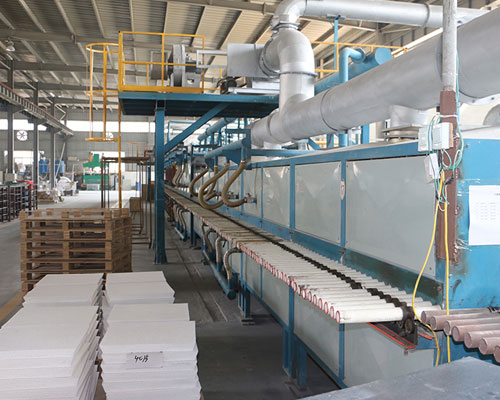The presence of impurities and particulate inclusions can cause aesthetic and functional issues, ultimately resulting in higher costs due to waste and additional processing. Therefore, it is very important for the metal industry to reduce the content of such impurities in its products. Although improvements in materials, processes, and metal processing have reduced the amount of inclusions, filtration can still achieve further reductions. Conventional filter media include glass fiber or metal screens, ceramic filter cores, extruded monoliths, unbounded spherical aggregate beds or bonded aggregates, and widely used ceramic foam filters. These filters were first used for the primary aluminum casting application. AdTech has a ceramic foam filter production line that can meet the production of primary aluminum castings in aluminum smelters.
Ceramic Foam Filter Production
The conventional ceramic foam filter is made of an open-cell hydrophilic flexible foam material having interconnected voids, which are surrounded by a net of the flexible foam material. The foam has 2-25 pores per centimeter and must be able to burn at or below the firing temperature of the ceramic material. The size of the foam material depends on the desired size of the end filter material and usually has a thickness of 2 to 5 cm.
The aqueous ceramic slurry is naturally used on the required ceramic material to filter the selected metal. The slurry must have certain characteristics so that the final product can withstand the corrosion of molten metal under chemical attack, mechanical strength, and high temperature conditions. In addition, the slurry should have high fluidity and should consist of the ceramic water suspension intended for the filter. Typical ceramic materials that can be used include aluminum oxide, chromium oxide, zirconium oxide, magnesium oxide, titanium oxide, silicon dioxide, silicon carbide, and mixtures thereof.
For use with molten aluminum and its alloys, alumina-based slurries are very satisfactory. In order to use copper and its alloys, zirconium oxide or chromium oxide is preferred. For steel castings, usually partially stabilized zirconia, high alumina, zirconia-alumina mixtures, and silicon carbide filters are used. Generally, the slurry contains 10 to 40% water. Additives such as adhesives and foam wetting agents can be used in the slurry.

